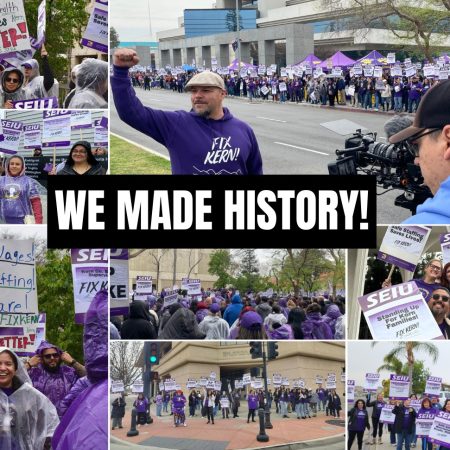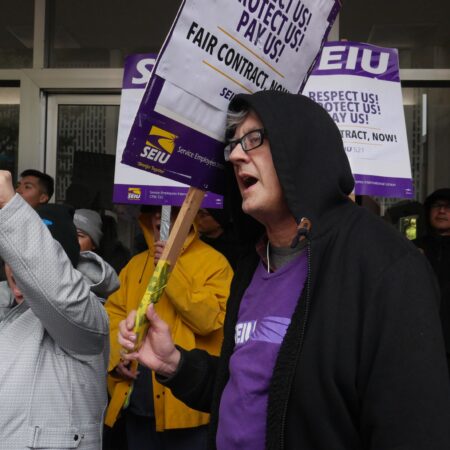
Form a Union at Your Workplace
Are you looking to organize a union at your workplace? Have questions about forming a union? Contact Calvin Johnson, External Organizing Director at calvin.johnson@seiu521.org. We’ll be happy to help you start building a brighter future for you and your co-workers today.
Gallup: Approval of Labor Unions at Highest Point Since 1965
STORY HIGHLIGHTS
- 68% approve of labor unions, highest since 1965
- 90% of Democrats, 47% of Republicans approve of unions
- Labor union membership remains steady at 9% of U.S. adults
CNBC: Employees everywhere are organizing. Here’s why it’s happening now
KEY POINTS
- The first half of 2022 saw a spike in worker union petitioning.
- Companies from airlines to retail to tech are seeing employees seek unionization.
- Political environments, communication across company lines and the Covid-19 pandemic played the biggest roles in spurring a national labor movement.
Know your Rights During your Union Organizing Drive
Under federal law[i], workers have the right to:
- Organize a union to negotiate with your employer concerning your wages, hours, and other terms & conditions of employment.
- Form, join or assist a union.
- Bargain collectively through representatives of employees’ own choosing for a contract with your employer setting your wages, benefits, hours, and other working conditions.
- Discuss union organizing with your co-workers or a union.
- Solicit coworkers to sign union authorization cards.
- Distribute union literature, wear union buttons t-shirts, or other insignia[ii].
- Strike and picket, depending on the purpose or means of the strike or the picketing.
- Participate in other concerted activities with your coworkers, as covered under the National Labor Relations Act.
Under federal law, it is illegal for your employer to:
- Prohibit you from talking about or soliciting for a union during non-work time, such as before or after work or during break times; or from distributing union literature during non-work time, in non-work areas, such as parking lots or break rooms.
- Coercively question employees about their own or coworkers’ union activities or sympathies[iii].
- Question you about your union support or activities in a manner that discourages you from engaging in that activity.
- Fire, demote, or transfer you, or reduce your hours or change your shift, or otherwise take adverse action against you, or threaten to take any of these actions, because you join or support a union, or because you engage in concerted activity for mutual aid and protection, or because you choose not to engage in any such activity.
- Threatenyouwithadverseconsequences, such as closing your workplace, loss of benefits, or more onerous working conditions, if employees support a union, engage in union activity, or select a union to represent them.
- Promise or grant promotions, pay raises, or other benefits to discourage or encourage union support.
- Prohibit you from wearing union hats, buttons, t-shirts, and pins in the workplace except under special circumstances.
- Deny off-duty employees access to outside nonworking areas of the employer’ s property unless business reasons justify it.
- Convey the message that selecting a union would be futile.
- Spy on[iv] or videotape peaceful union activities and gatherings or pretend to do so.
UNION ELECTION RULES:[v]
“If an election is held, it will be conducted by the NLRB by secret ballot and Notices of Election will be posted before the election giving complete details for voting. The NLRB applies rules that are intended to keep its elections fair and honest and that result in a free choice. If agents of any party act in such a way as to interfere with your right to a free election, the election can be set aside by the NLRB. Where appropriate the NLRB provides other remedies, such as reinstatement for employees fired for exercising their rights, including backpay from the party responsible for their discharge. The following are examples of conduct that interfere with employees’ rights and may result in setting aside the election:
- Threatening loss of jobs or benefits by an employer or a union
- Promising or granting promotions, pay raises, or other benefits, to influence an employee’s vote by a party capable of carrying out such promises
- An employer firing employees to discourage or encourage union activity or a union causing them to be fired to encourage union activity
- Making campaign speeches to assembled groups of employees on company time, where attendance is mandatory, within the 24-hour period before the polls for the election first open or, if the election is conducted by mail, from the time and date the ballots are scheduled to be sent out by the Region until the time and date set for their return
- Incitement by either an employer or a union of racial or religious prejudice by inflammatory appeals
- Threatening physical force or violence to employees by a union or an employer to influence their votes”
Information Sources: National Labor Relations Board Resources.
- Form NLRB-5492, National Labor Relations Board, “Notice of Petition for Election”
- nlrb.gov/resources/faq/nlrb#t38n3180
- nlrb.gov/sites/default/files/attachments/basic-page/node-3788/employeerightsposter-8-5×11.pdf
- nlrb.gov/rights-we-protect/whats-law/employees/i-am-not-represented-union/your-rights-during-union-organizing
- nlrb.gov/rights-we-protect/whats-law/employers/interfering-employee-rights-section-7-8a1
The National Labor Relations Act (NLRA) is a federal law that grants employees the right to form or join unions; engage in protected, concerted activities to address or improve working conditions; or refrain from engaging in these activities. The NLRB is an independent federal agency created to enforce the National Labor Relations Act.
[ii]except in unusual “special circumstances”
[iii]Whether questioning is coercive and therefore unlawful depends on the relevant circumstances, including who asks the questions, where, and how; what information is sought; whether the questioned employee is an open and active union supporter; and whether the questioning occurs in a context of other unfair labor practices.
[iv]”Spying” means doing something out of the ordinary to observe the activity. Seeing open union activity in workplace areas frequented by supervisors is not “spying.”
[v]Taken from Form NLRB-5492, National Labor Relations Board, Notice of Petition for Election. Full text and copies of the Form are posted in the Employer’s premises, and available from the Union and the Employer.


